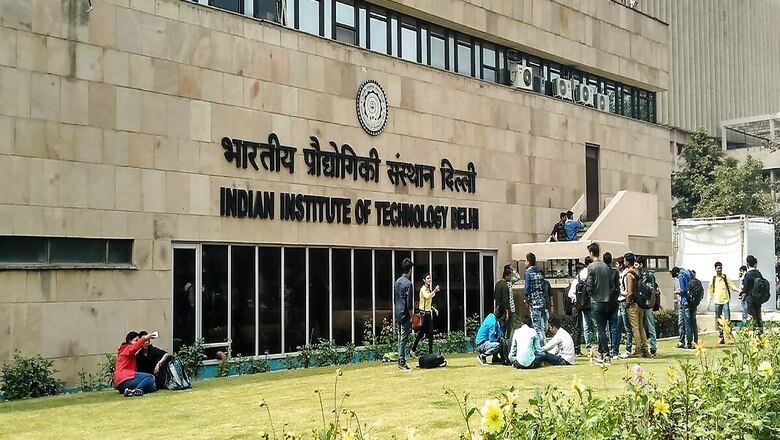
views
A committee comprising Indian Institute of Technology directors and members of government ministries recently recommended for removal of reservation in IIT faculty recruitment. Ironically, the committee was set up to provide an explanation as to why faculty reservation is not fulfilled. The committee has, instead, asked for targeted faculty searches as is done in the west.
It also suggested starting a programme to train students from SC/ST/OBCs backgrounds for a period of two years before inducting them into PhD, with no guarantee of PhD admission. The reason cited by the committee for exemption from implementing reservations in faculty recruitment is ‘commitment to excellence’. A similar letter was written by IIM Directors to the Ministry of Education asking IIMs to be exempt from faculty reservations.
What is academic excellence as per the elite?
We must break down this “academic excellence” argument. IITs are known the world over for their exceptional students in their B Tech programmes. What separates the B Tech programs from all other programs at the IITs is its intake through the JEEs (Joint Entrance Exam). These exams are considered one of the toughest exams in the world.
Despite the argument that JEE score can be “manufactured” through coaching centres, rather than being a measure of intelligence, it still provides a measure of analytical abilities of the candidate. This is the reason why the B Tech graduates from the IITs are sought after worldwide.
Since the IITs have used this as the selling point of academic merit, how does it correlate with the claimed merit of faculty members? Except for a minuscule number, most of the faculty in the IITs have never cleared the JEE. So, the selling point of the IIT brand, an entry through the JEE, a proxy for excellence, doesn’t qualify the faculty members.
Let us also understand how the IITs assess their faculty members during recruitment. The way research unfolds, it can be safely concluded that the PhD and Postdoctoral publications and experience are really a reference to the guide under whose guidance the candidate has worked and not necessarily the intrinsic merit of the candidate. What the IITs are really advertising as merit in their faculty hires is nothing other than their candidate being at the right place at the right time working under the right people.
This also implies that if the SC/ST/OBC candidates were to work with the same guides, they would have the same credentials. The argument that the SC/ST/OBC candidates lack the abilities (as is always lazily advertised) even after being provided the opportunities fall flat given that the IIT faculty members themselves are of average aptitude based on their failure to qualify the JEE.
Also, research in science and technology is about ideas and ideas cannot be learned through rote learning. A wide variety of ideas come through diverse backgrounds. Diverse recruitment would only add to research output, instead of hiring from a narrow pool of higher caste candidates who have a resume only because of being connected with influential guides.
Look at Ivy Leagues
Except for a minuscule number, the vast majority of faculty members at the IITs are unable to secure faculty positions abroad, and IITs offer a convenient place to further their academic careers. For all the acclaimed merit, except for a minuscule number, the faculty members at IITs are not known internationally for their contribution to research.
The reason to bring this up is that one should consider how the recruitment is done from a very diverse pool in the world-renowned research institutions. Considering the California system of universities, the majority of them are of Ivy League status and are the highest-ranked in the world in terms of research achievements, unlike the IITs that do not figure anywhere. Refer to the University of California diversity recruitment policies that specifically lay down the guidelines as to how targeted hiring must be done to ensure any gaps that cannot be explained.
The policy lays down, the faculty numbers for women and minorities should be in proportion to their population and if found lower, targeted recruitment must be undertaken. That is the modus operandi of an Ivy League institution.
The committee made up of IIT directors suggested following the western model of targeted hiring instead of quotas in faculty recruitment. Have the IITs been following the above methodology of hiring faculty members from SC/ST/OBCs, especially after the reservations being mandated by law? Or will they start this process once the reservations are removed? It is important to note that the California Universities have produced tens of Nobel laureates while we yearn for a single Nobel from within the IIT academics.
… ‘Because then California Schools will be called racist’
Another question to ask here is why California Schools aren’t following the “wisdom of improving hiring of minorities” by asking for the introduction of two years of training for PhDs, with the added catch that the two years training doesn’t guarantee an entry into a PhD program. Obviously, the California Schools would dare not do such a thing, because such policies would be termed racist and would malign the international reputation of these schools.
That the IITs could consider policies that are viewed as racist in the western world should make anyone question the sincerity of these institutes in addressing caste diversity issues.
Policies of US ensure diversity
A cursory reading of the policy guidelines of the US University system would tell us how to go about the recruitment of faculty to bridge the caste diversity gap.
As mandated in the US universities, do the IITs have any auditing systems and set placement goals in hiring faculties from SC/ST/OBCs? Do the IITs have an equitable representation of SC/ST/OBCs on their search committees? Have the IITs even considered questions of representation of SC/ST/OBCs in the candidate pools they recruit from? Have the IITs established systems to thoroughly scrutinize reasons behind the rejection of candidates belonging to the SC/ST/OBCs?
A common refrain is candidates are not available. How many SC/ST/OBC PhD graduates from the IIT system were offered a faculty position? How about SC/ST/OBC PhD graduates from Indian institutes that are ranked higher in research than the IITs? How about SC/ST/OBC PhD graduates who have degrees from abroad? The sum total of all SC/ST/OBC PhD graduates would easily outnumber the number of faculty positions for SC/ST/OBCs in IITs. However, still those remaining vacant can only be explained as inherent biases in faculty recruitment.
The top 10 IIMs have just about 10 faculty members from SC/ST backgrounds out of 600 total faculty members. There is only one Muslim faculty member in the top four IIMs. With so many hurdles, when someone makes it to the faculty position, he is hounded as less capable as one could see in Dr Sadrela’s case of IIT Kanpur.
Shouldn’t the IIT and IIM faculty be provided the gender and caste sensitisation training? It will go a long way in making the campuses inclusive.
Affirmative action is academic value
For the University of California, commitment to affirmative action is a commitment to academic values for a couple of reasons like diversity and inclusion. It is a matter of pride. Let me produce what I think can be replicated in our elite institutes that considered reservation a non-academic factor.
To quote “The Federal regulations also require each campus to develop and implement an auditing system that periodically measures the effectiveness of its total affirmative action program.”
Further lays down the example of a good auditing system, “A good auditing system should include: (1) monitoring all personnel transactions and compensation practices to ensure that the nondiscrimination policy is enforced; (2) producing regular internal reports regarding the goals and achievements of the affirmative action program; and (3) advising top management of the status and effectiveness of the faculty affirmative action program, along with recommendations to improve any areas of unsatisfactory performance.
The guidelines explain how each department is expected to make an effort to appoint a search committee that represents a diverse cross-section of the faculty.
Read all the Latest News, Breaking News and Coronavirus News here


















Comments
0 comment